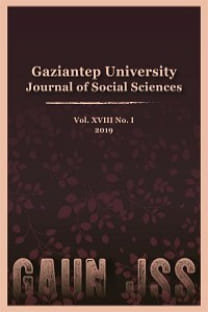Hari Kunzru’nun Aktarım İsimli Eseri ve Küresel Risk Toplumu
Risk Toplumu, karmaşıklık, küreselleşme, Ulrich Beck, Hari Kunzru
Hari Kunzru’s Transmission and Global Risk Society
complexity, : Risk Society, globalisation, Ulrich Beck, Hari Kunzru,
___
- Adam, B., Beck, U. & Van Loon, J., (eds). (2000). The Risk society and beyond. London: Sage.
- Aldama, F., (2006) “Postcolonial imaginings: A Conversation with Hari Kunzru.” Interdisciplenary literary studies 8, no.1, 110-117.
- Beck, U., (2004). Cosmopolitan vision. 2004
- Beck, U., (2006). “Living in the world risk society” Economy and society 35(3), 329-345.
- Bhabha, H., (1992). “The World and the home” Social text No.31/32, 141-153.
- Childs, P. & Green, J., (2013). Aesthetics and ethics in twenty-first century British novels. London: Bloomsbury.
- Filipczak, I., (2014). “Immigrant to a terrorist: On liquid fears in Hari Kunzru’s Transmission” Brno Studies in English, 40(2), 67-76.
- Giddens, A., (2002). Runaway World: How Globalisation is reshaping our lives. London: Profile books.
- Goldin, I. & Mariathasan, M., (2014). The Butterfly Defect: How Globalisation creates systemic risks, and what to do about it. Princeton: Princeton university press.
- Kunzru, H., (2005). Transmission. London: Penguin.
- Lanier, J., (2013). Who owns the future? Simon and schuster e-book.
- Leonard, P., (2014) “A Revolution in code”? Hari Kunzru’s Transmission and the cultural politics of hacking” Textual practice, 28(2), 267-287.
- ISSN: 1303-0094
- Yayın Aralığı: Yılda 4 Sayı
- Başlangıç: 1991
- Yayıncı: Gaziantep Üniv. Sosyal Bilimler Enst.
The Neccessity of Externalization of Costs of Syrian Refugees (The Case of Turkey)
Hacı Mustafa PAKSOY, Gümrah Can BAŞDAĞ
SİYASAL LİDERLİKTE YENİ BİR MODEL ÖNERİSİ: RECEP TAYYİP ERDOĞAN ÖRNEĞİ
Türkiye’de İhracat, İthalat ve Ekonomik Büyüme İlişkisi: ARDL Sınır Testi Yaklaşımı
Türkiye’de Turizm Coğrafyası Araştırmalarında Disipliner İlişkinin Sosyal Ağ Analizi ile İncelenmesi
İsmail KERVANKIRAN, Fatma SERT ETEMAN, Ayşe ŞARDAĞ
İslam Dünyası’nda Bimaristanlar Ve Gelişme Süreçleri
Suriyeli Mültecilerin Maliyetinin Dışsallaştırılması Gerekliliği (Türkiye Örneği)
H. Mustafa PAKSOY, Gümrah Can BAŞDAĞ
Akıllı Kent: Öğreten Kentlerden Öğrenen Kentlilere
Philip Roth’un The Human Stain Adlı Romanında Kimliğin Söylemsel İnşası
Kazuo Ishiguro’nun Günden Kalanlar Romanında Anlatı Güvenilmezliğinin İmaları
